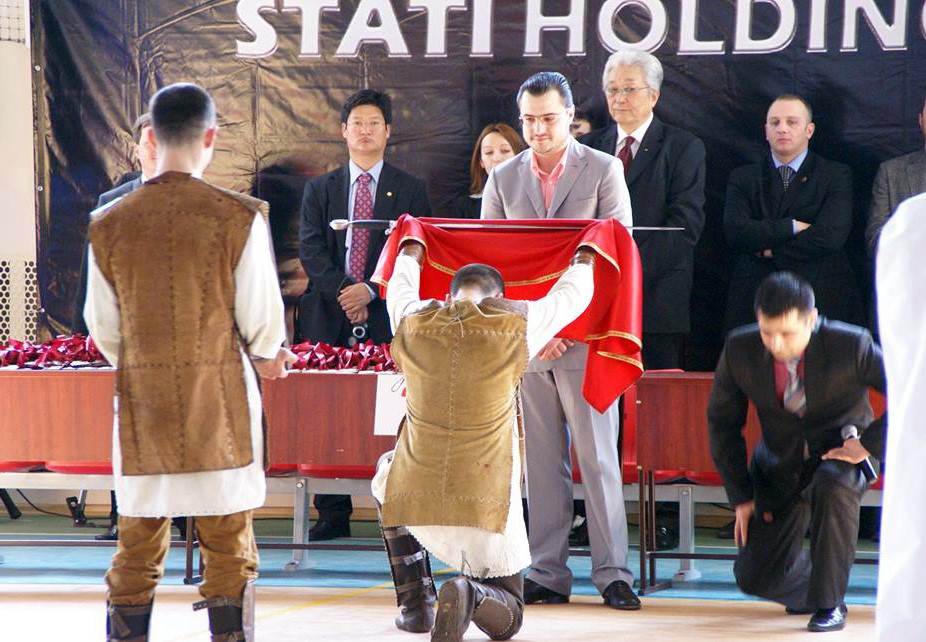
This is the sad and disturbing story of a small country, which has been forgotten by progress, and in which few families have used the implosion of the Warsaw Pact to adopt democratic and capitalist systems to become the masters of the country with an autocratic and monarchical attitude – regardless of international economic and industrial rules. Their only limit, as we will see, are the covenants they must make with the armies of the surrounding nations. Justice is a luxury option in Moldova that no one needs.
It has always been like that. Tsar Peter the Great stopped there in 1711[1]. The river Prut, which rises in the depths of Ukraine and then flows into the Danube for 900 km, forms a natural border between the countries under Russian influence and those under Ottoman influence[2], especially after the end of the war between Russia and Turkey in 1812[3]. This is the reason why this region in the northeast of was called Bessarabia, which means “without Arabs”[4]. For more than 400 years, this natural border was the dividing line between Asia and Europe, between Christianity and Islam, between Romania and Ukraine – until the division of the world decided at the end of World War I moved the borders of Romania to the Dniester and the Tyra rivers, for more than 200 km to the east[5].
An underdeveloped country, largely illiterate, which never worries the monarchy of Saint Petersburg in the slightest, and which therefore has sufficient space for autonomy[6] until the Bolshevik revolution arrives to throw everything away in chaos. Suddenly, the independence of the inhabitants of these regions, but especially anti-Bolshevik advances: on March 27, 1918, the Romanian army entered Chişinău and officially annexed Bessarabia[7]. On October 12, 1924, the Soviet Union, which did not recognize the annexation of Bessarabia to Romania, founded an autonomous republic called Moldavia[8] on the territory of Ukraine between the rivers Nistro, Dniester and Boug.
Just over 150 km of paved roads, less than a thousand km of railroads, which only connect Chişinău to Bucharest and Odessa – the rest of the country is inaccessible[9]. Romania is focused on abolishing the autonomy of farmers, sending civil servants and thus taking control of the economy. The administrative system of Zemstvo[10], which had given the inhabitants of the region sufficient space for autonomy, was abolished, which aroused hostility from the population, who had already tolerated the introduction of the Gregorian calendar and the change of opening hours. offices and shops – mention the introduction of the Latin alphabet instead of Cyrillic quite well[11].
The Russian minority (which numbered around 320,000 units in 1930) was harshly treated; Russian-language publications were banned, Russian libraries and schools were closed, and administrative staff were cleaned up[12]. The Russians are seen as enemies, Bolsheviks, suspects, highlighted by the terror and propaganda activities funded by Moscow. In August 1939, when the Ribbentrop-Molotov treaty was signed, the USSR asked Germany to declare its disinterest in Bessarabia, so that the Soviets wished to reconquer this country as quickly as possible[13].
The Soviet domination
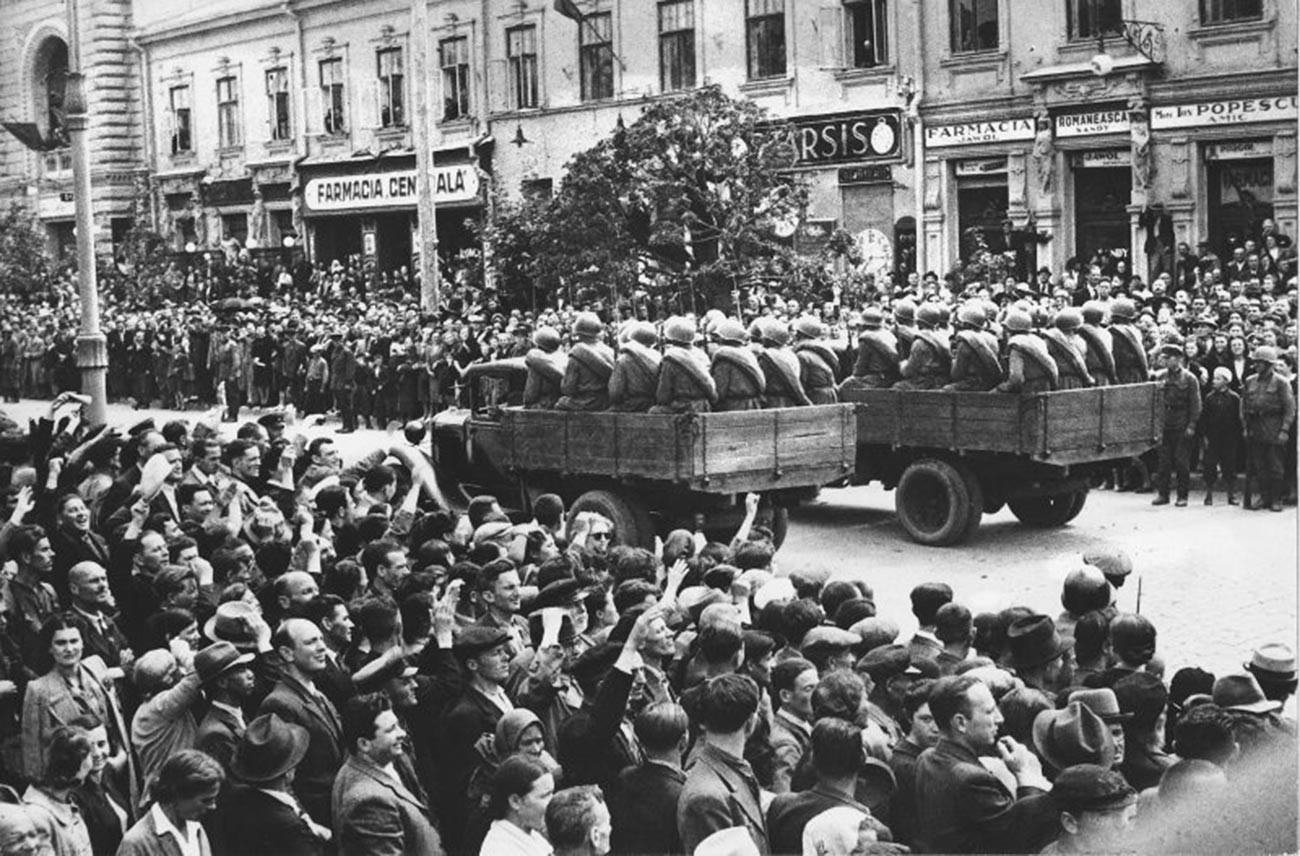
Immediately after the invasion, Soviet troops marched through the streets of Chişinău[14]
The Red Army entered Chişinău on June 28, 1940[15], and from that time until the collapse of the Soviet Union, Moldova would be part of the Russian sphere of influence but would be part of the national borders of the Romania[16]. Moldovan independence came on August 27, 1991[17] – an uprising independence from Moscow that led to a bloody, albeit brief, civil war in the Transnistria region in 1992.
The separation from Moldova was never recognized by the United Nations, but that did not prevent a government inspired and supported by Russia[18] from wielding power in Tiraspol. During the years of the USSR, the population mixed, also because, according to the calculations of the Presidential Commission for the Study of the Communist Dictatorship in Romania, during the years of occupation, about 90,000 people were arrested. and deported to Siberia or Kazakhstan, and many Russians came to Moldova to occupy key positions in public administration and the military[19].
One of the shameful economic effects of belonging to the Soviet bloc (besides the fact that Moldova has no exit to the sea and that the Prut is not navigable everywhere) is the fact that collectivization has taken place made through agricultural structures that were already obsolete 150 years ago[20]. The land was used only as the granary and vegetable garden of the Soviet Union, in a situation where 98% of the product was distributed to the rest of the USSR because the central regime regarded the industrial regions as a priority[21].
In 1992, at the time of independence, the new government was confronted with a dramatic situation characterized by: a management in the hands of too many technicians of the old regime, incapable and unprepared, led (between 2001 and 2009) by Vladimir Voronin, a cadre of the former Moldovan Communist Party[22]; soil that has been heavily contaminated for decades by excessive use of pesticides[23]; massive deforestation resulting in instability due to soil erosion phenomena[24]; a high frequency of drought periods in summer[25]; poor industrialization[26]; a lack of transport network which weighed heavily on economic growth[27].
In this situation, on January 2, 1992, the government decided to introduce free market rules – a fatal shock: the Moldovan leu was born, replacing the ruble[28]; prices will be liberalized and at the same time all subsidies against hunger and cold will be abolished[29]; houses are privatized, rents increase exponentially[30]; the agricultural lands of public enterprises are being privatized in order to avoid the problems of their collectivist management[31]. To privatize the birth of the industry, a stock exchange was created (1995) [32]. Electricity is imported from Ukraine (with private contracts) after having been imported from Russia for years[33]: almost half of the population lives as beggars on the streets and has no work or livelihood[34], the trade balance is increasing in debt, GDP is growing too slowly[35].
Even today, after twenty years of horse care and currency injections by the International Monetary Fund and individual countries[36] (and the sending of livelihoods by international NGOs), Moldova is the poorest nation of Europe and the one in which all economic, industrial, infrastructural and economic sectors. Political data by country (relating to the many necessary reforms) are negative, as shown by the maps of international agencies assessing the investment potential[37].
Also because 2014 after more than 20 years of international subsidies and liberal corrective measures, and due to the lack of tax reform that goes beyond simple archaic trade relations; banking rules that protect the interests of investors and savers; and from the creation of system laws for industrial and commercial credits[38], the entire banking system born out of independence collapsed, as the International Monetary Fund explains: “Since the end of 2014, the economy of Moldova was hit by a number of shocks (…): Massive fraud in the banking system, which led to the closure of three banks at a public cost of 10% of GDP. In the following period, confidence collapsed, facilitated external financing largely froze, and international reserves fell by a third, as monetary conditions tightened sharply. Internal political unrest marked by three changes of government resulted in limited solutions and delayed cooperation with the international community on possible financial support[39]”.
Operation Titirezul
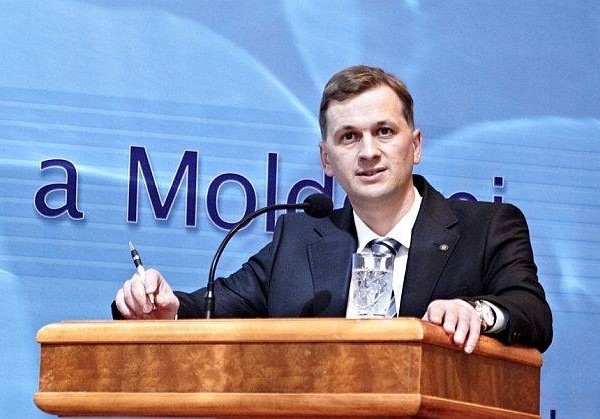
November 24, 2014: The young governor of the National Bank of Moldova, Dorin Drăguţanu, informs the press and the astonished nation of the methods and consequences of the bank fraud called Operation Titirezul[40]
The 2014 banking scandal, Operation Titirezul (from Romanian: the spinning top), affected three banks (Banca de Economii, Unibank and Banca Socială, or 35% of the Moldovan banking system[41]), which defrauded their customers for a total of ‘about $ 1 billion[42]. The fraud, the criminal and political implications of which only became apparent in 2019, was conceived by the chairman of the board of directors of Banca de Economii, Moldovan businessman Ilan Shor[43], who had used the funds reserve of the bank from the deposits of its customers to make a speculative investment to simulate the London and Hong Kong stock exchanges[44].
According to the Kroll report[45], Shor and his accomplices worked together in 2012 to acquire a controlling stake in three Moldovan banks and then gradually increase the banks’ apparent liquidity through a series of complex transactions involving interbank lending. The three banks then, according to the report, made multi-million dollar loans to companies that Shor controlled or with which they were affiliated. Finally, in just three days, more than $ 767 million disappeared from the banks thanks to complex transactions[46].
Much of this money was transferred to offshore companies affiliated with Shor, and one of them was deposited into Latvian bank accounts under the names of various foreigners. As mentioned earlier, the Central Bank of Moldova was forced to bail out the three banks with $ 870 million in emergency loans[47]. This should keep the economy alive and create a hole in public finances equal to one eighth of GDP[48]. Moreover: During the sessions of parliamentarians on Operation Titirezul, which took place between 2017 and 2019, the deputy director of the intelligence services of the Republic of Moldova, Vadim Vrabie, said that Prime Minister Nicolae Timofti knew the details of fraud since 2013[49].
In the aftermath, the arrest without explanation of public prosecutor Viorel Morari, who was investigating Titirezul and possible Russian government funds to the Socialist Party and President Igor Dodon increased the instability[50]. Politically, despite the wave of public contempt, the Socialist Party resisted until the 2019 elections when it was forced to join an emergency coalition led by the pro-European Maia Sandu, to which all parties in parliament participated[51].
A fictitious deal that collapsed after five months (June 8, 2019 – November 14, 2019) and was replaced by a minority government led by former finance minister Ion Chicu, a personal friend of Igor Dodon – and the machine organizer of the richest and most powerful oligarch in the country, Vlad Plahotniuc[52], and tolerated (thanks to the decision to abstain on important votes) by the Democratic Party of Vlad Filat, which controlled the majority of the members of the committee of parliamentary investigation, but who after the Maia Sandu affair was drawn into the vortex of Operation Titirezul and sentenced to 9 years in prison[53].
The hindsight is enormous. The European Union, the International Monetary Fund and the World Bank are blocking financial support for Moldova[54] because the justice system tries to follow all the bureaucratic path and accept as few compromises as possible: in 2015 alone, there are had 44 criminal cases related to politicians, bankers and fixers, all involved in illegal financial activities. The population cancels everything in the first elections, and on November 15, 2020, economist Maia Sandu, former prime minister of the emergency government and openly pro-American[55] and above all pro-European[56], will be elected new president.
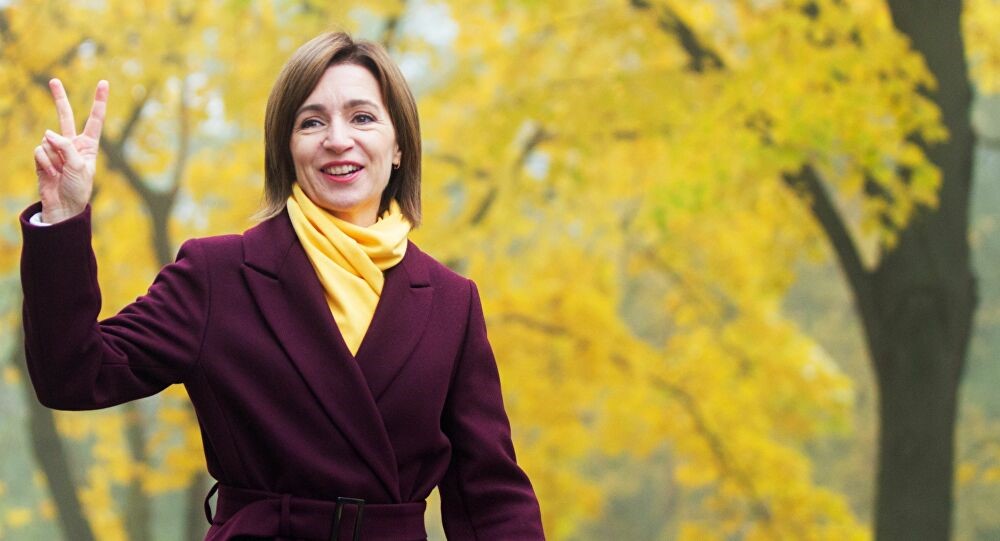
The President of Moldova, Maia Sandu[57]
In the years when the scandal erupted, Ms Sandu had also been a candidate for the post of Prime Minister, but had imposed unacceptable conditions on the parties: resignation of the Governor of the National Bank of Moldova, Dorin Drăguţanu, and of the Corneliu Gurin[58] State Prosecutor; free entry into the European Union to prevent the Moldovan diaspora from leaving their country in search of a Romanian passport (1,000,000 since independence to date[59], a significant number if we consider that in 2015, about half a million Moldovans out of a population of 3.5 million people were granted Romanian nationality[60]); the end of the Russian occupation of Transnistria[61].
All the conditions are unacceptable for the Russians and for the Moldovan politicians who are still loyal to Moscow, because they fear that Moldova, which not only Vladimir Putin still considers part of the Russian Federation, will one day be part of the ‘European Union NATO[62] could. Moscow is also fighting for other goals: the rejection of Chinese economic colonialism, which has prevailed over the past three years[63], and the defense of the minority against Gagauzia, which brings together 15 communities in three non-contiguous neighborhoods, in the middle of Moldova and with the capital Comrat[64], a city of 25,000 inhabitants, 120 km south of Chişinău and 200 km west of Odessa.
As mentioned earlier, the Chinese began to understand the potential of a sparsely populated country without infrastructure or money: in 2019, the Sandu government signed a contract with the China Highway Group and the China Railway Group to build nearly 300 kilometers of road with an estimated cost of $ 400 million: the Chişinău ring road and a highway that connects the capital to the Ukrainian port of Odessa[65]. In April 2019, twelve Beijing companies participating in the Chişinău Business Forum pledged to start major infrastructure projects in the coming months[66].
The phantom republic of Transnistria
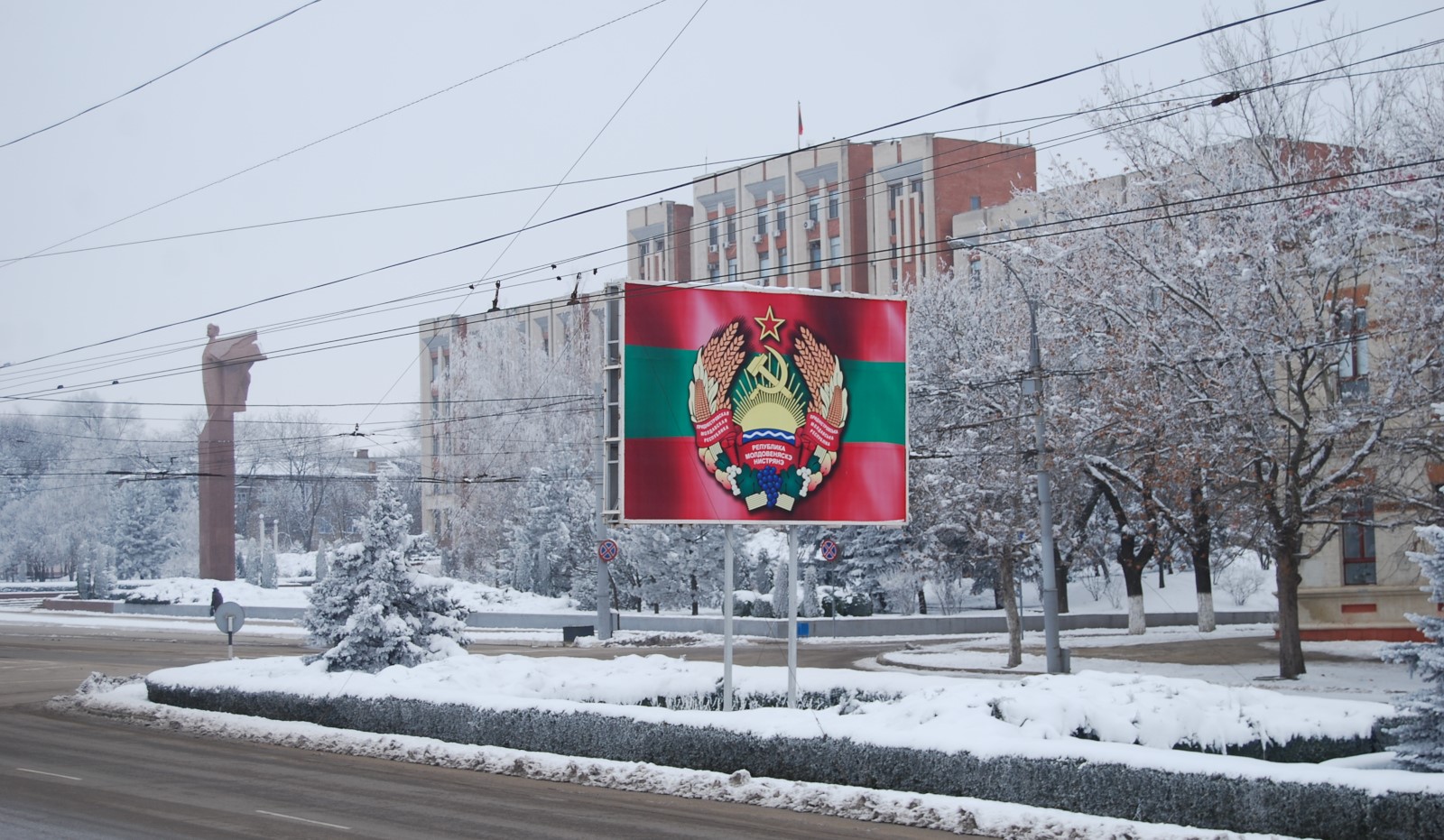
Tiraspol Government Palace, symbol of the pro-Russian politico-military power of the Republic of Pridnestrov[67]
Transnistria is a thin strip of Moldovan country, one of the most controversial in Central Asia and controlled by the Russian mafia and former KGB agents. It is the European hub for criminal trafficking: from drugs to cigarettes, from alcohol to weapons, from radioactive materials to petroleum[68]. This area emerged from the strong local opposition to any assumptions of democratization and transition to a market economy that characterized the post-Soviet era, and arose at the end of a bloody, albeit short-lived, civil war[69].
Although it is not recognized by any country in the world, Transnistria enjoys considerable support and opposition from the nations who have an interest in supporting, protecting[70] and combating[71] it for various reasons: it does not enforce the laws of Moldova, not even European or Soviet ones, everything is decided by certain criminal bosses who sit in the government building in Tiraspol – a government which has no interest in protecting its citizens because they are caught hostage or because no one is preventing them because they are fleeing.
Here, the red stars and bronze statues of Lenin are still part of the cityscape, such as the huge towering above the tall Soviet building in Tiraspol and the founder of Transnistria, Igor Smirnov[72], a local boss who calls himself president, after a vote (1991), which was seen only as a “facade[73]“.
In the end, two armies face each other in Transnistria. The civil war (1992) left more than 1000 dead in a few months: the Ukrainian Cossacks and ten thousand soldiers of the 14th corps of the Russian army under the command of General Alexander Lebed come to the aid of the separatists, while the Moldovans receive support contingents of Romanian volunteers[74]. The latter, however, are not so motivated: after a ceasefire, Russian troops turn into “peacekeepers” – and despite repeated promises, Russian soldiers never withdrew[75].
Smirnov, like Viktor Bout, owes its commercial success to the fact that the Red Army in Transnistria abandons more than 40,000 tons of war material which Smirnov has taken over and managed: some of it is sold worldwide through its industrial group Sheriff, now owned by his son Vladimir and his longtime partner Ilya Kazmaly[76]. Sheriff achieves an annual turnover of four billion dollars (47 times the Moldovan national GDP), manages the production and trade of all kinds of weapons, copied at prices lower than the original ones: Makarov pistols, colts police, Vasiliok mine launchers, Gnom grenade launcher and Spg9, RPG7 anti-tank missiles, BM 21 Grad missiles, Duga portable missiles – in addition to the dreaded Alazan missiles with radioactive isotope warheads and the enormous quantities of chemical and radioactive substances that remained in local Red Army[77] military camps.
According to the Western police and secret services, terrorists from all over the world come here to provide for themselves: from the Middle East to the Balkans to Africa, among the guests of the Smirnov soldiers identified as the guests of the factions involved in the civil war in Yugoslavia were African coup plotters, Palestinian and Chechen guerrillas and Al Qaeda leaders[78].
The winners of the law of the jungle
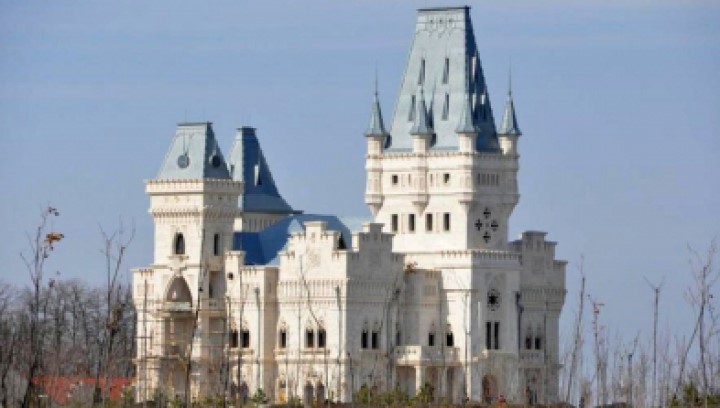
Truşeni Castle, in a village on the northern border of Chişinău, on the shores of Lake Sireți Ghidighici[79]
In this situation of extreme poverty and great political, economic and military instability, it is not the captains of industry but the oligarchs who are born – and Moldova also has its own: Anatole Stati, his wife Larisa, his son Gabriel and his daughter Nicoleta. People who get their hands dirty when necessary and now lead a princely life associated with the Russian aristocracy and the Western jet-set[80]. The States of Anatole, like many oligarchs, started as an engineer, then became manager of industrial combines, and finally, when the USSR collapsed, he controlled the stocks of the companies he previously ran for the account of the people and the CPSU[81].
He started trading oil with Kazakhstan[82] until his company Tristan Oil was nationalized (apparently illegally[83]) by the Astana[84] government, then step by step from there he created the Ascom group, which is the center of its financial, commercial and economic activity represents industrial empire[85]. A few years after leaving Kazakhstan, Ascom expanded to Chelyabinsk (Russia), Ploiesti (Romania) [86] and from December 2000 to Turkmenistan[87] and finally (2005) to Sudan[88].
Ascom’s headquarters are located in a beautiful building at 75 Mateevici Street in Chişinău, which is also the headquarters of the Organization for Security and Cooperation (OECD)[89] mission. The building, which was valued at over 70 million lei ($ 3.5 million) in 2009, is owned by Novitas SA, i.e. Anatol, Larisa and Gabriel Stati, and was also intended to house the private TV-style television, which, however, was not licensed to broadcast[90]. Anatole has two children: Nicoleta[91], director of the “Igor Vieru” School of Fine Arts in Chişinău, and Gabriel, her father’s companion[92].
To also understand the importance of the group for politics, just look at the ministers who worked for the Stati family in their training: former Prime Minister Iurie Leanca, who was vice-president of Ascom between 2007 and 2009[93] ; Deputy Prime Minister Eugen Carpov, who was head of the department for international cooperation between 2007 and 2008[94]; former Secretary of Defense and former Minister of Transport, Anatol Salaru, who spent many years at Ascom[95].
For this reason, Ascom has been absolutely untouchable for years and has continued to grow under the guidelines of most of its competitors, as provided for by the law of the jungle of the global oil trade: creation of dozens of oasis tax corporations, which perform the task of collecting a large chunk of the profits from the tax authorities to go into hiding and also do the job of bribing foreign officials who control local operating and trade licenses – but all in broad daylight without having to protect themselves or to hide[96].
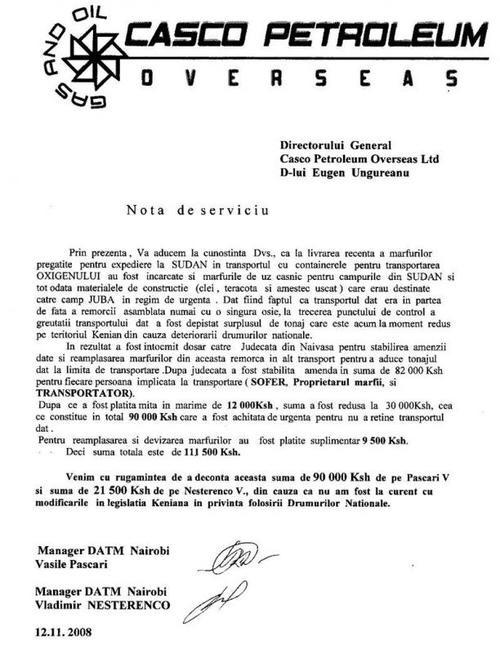
One of the memos from Casco Petroleum Overseas Ltd. Tortola, which allows illegal financial transactions
As the Stati family invested in South Sudan in 2005 (which was not yet independent at the time, just the southern region of Sudan, which was devoured by civil war[97]), they founded an offshore company, Casco Petroleum Overseas Ltd., controlled by Gabriel Stati (20%) and East-West International SA Luxembourg, the European family safe (80%)[98]. Casco Overseas is headed by two Moldovan executives, Eugen Ungureanu and Igor Garbuz, who put bribes on the company’s list of ordinary expenses both in their dealings with the Sudanese authorities and in their dealings with Kenyan authorities[99]. The director of Casco, Valeriu Ojog, for his part noted with the same honesty the income from tax evasion by falsifying the contracts of local workers who were officially hired for front-line companies but who belonged to Casco Petroleum anyway[100].
The same goes for business activities in Kenya, led by Andrei Baştovoi[101], a Moldovan parliamentarian, signatory of the Declaration of Independence, one of the main promoters of the National Liberation Movement, who from the beginning worked for Ascom in Turkmenistan, in Peru, Kazakhstan and East Africa – still as a corruption officer[102]. According to circles close to the secret services (former KGB agent Veaceslav Glotov), Ascom sacked Baştovoi and subsequently attempted to have Anatole and Gabriel Stati killed by a killer[103]. In Uganda, the pattern is repeated in a similar fashion. General Salim Saleh, a senior army officer and brother of President Yoweri Museveni, owns his own company, Akiba Products Ltd. Kampala, which signs a contract for 400 tonnes of agricultural products (corn, beans, vegetable oil and salt) with Casco. Of course, part of the charge does not exist, it is only evidence. to justify a corrupt payment[104].
Kazakhstan: Tristangate, financial problems and fraud
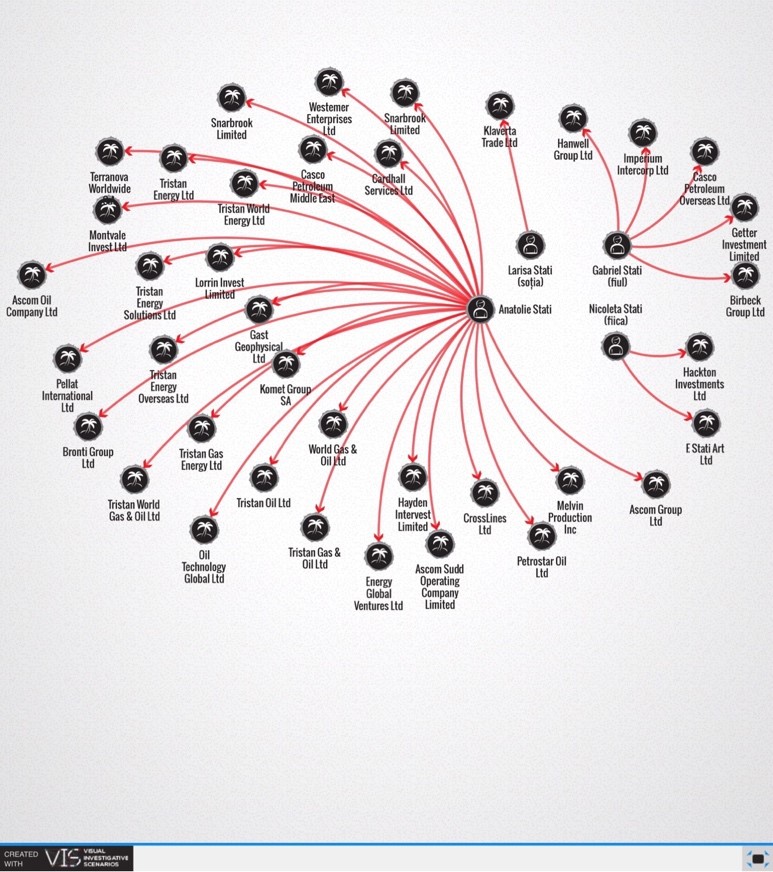
The official (therefore incomplete) system of offshore companies controlled by the Stati family
The country where the Stati family has risked the most is Kazakhstan, where Tristan Oil Ltd. has been involved in a series of operations since 2009 that have raised suspicions of illegality among those who invested and in the Kazakh government. The problem arose in 2009 because Anatole Stati does not appear to have the $ 27 million needed to pay the taxes owed that year. Ascom received a $ 57 million loan from Laren Holdings Ltd. Tortola has signed, which pays the tax authorities and uses the remaining money to buy Tristan Oil securities through SSTC Stichting Security Trustee Company BV Amsterdam – securities which SSTC receives at half price. This leads to a net loss at Tristan Oil (with which he would have repaid the loan), which is prevented by an objection from the partners of Tristan Oil[105].
Anatole Stati doesn’t know what to do. The only thing that comes to my mind is to work with another offshore company, Komet Group SA Tortola, to sell 60% of the Barda Rash oilfield in Kurdistan to the British company Afren plc for around $ 400 million – this that Tristan Oil is of course seriously depleted and is being sued by lawyers and investors[106].
The documents produced by Ascom worsen the situation as they have a budget deficit of almost half a billion, officially caused by the costs of exploration of Ascom licenses in Kazakhstan by KPM Kazpolmunay and TNG Tolkynneftegaz (two Kazakh companies controlled by Anatole and Gabriel Stati[107]). Because of this, Tristan Oil’s record in its desperate attempt to close this hole has turned into a mess of inexplicable losses now debated in court[108].
In the ongoing enforcement proceedings in various jurisdictions around the world, the Stati family has only one possible strategy: to prove that each of the individual contracts with bogus companies registered in the Virgin Islands, Panama, Gibraltar or elsewhere was a “real” contract, corresponds to an actual transaction – oil for dollars or verifiable services or advice found in negotiations[109]. The strategy worked for a while until KPMG, which is responsible for confirming the financial statements of Ascom and Tristan Oil, publicly announced on August 21, 2019 that “auditors’ reports cannot be relied on” [110].
This attitude suddenly changed the meaning of court decisions until, on February 11, 2021, the Luxembourg Court of Cassation accepted a request from Kazakhstan and overturned the previous decisions (all in favor of the Stati family) and decided to appoint new judgments and rethinking the whole procedural process[111] to reach the heart of the financial empire of the state family: East-West International SA Luxembourg, the financial company that controls Casco Petroleum Overseas and Kapsy Asia Service Company, which is at its the whole galaxy’s holding company round of companies that are in chaos in Kazakhstan is involved[112].
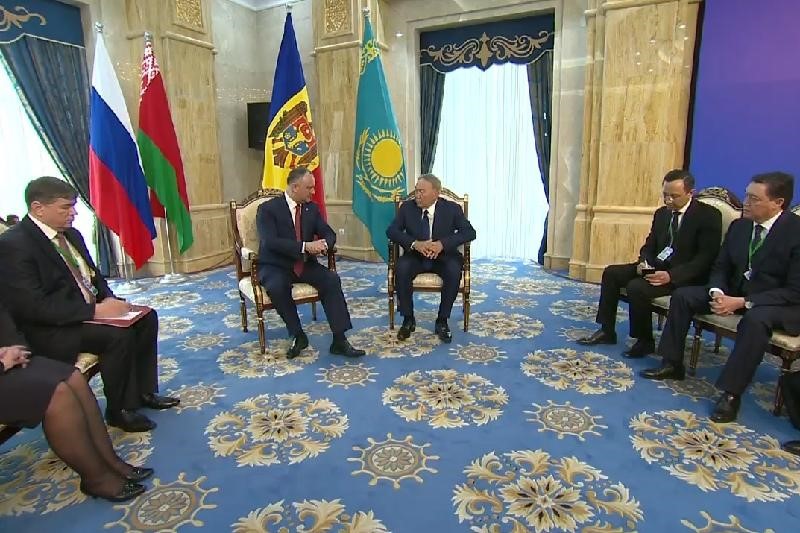
April 13, 2017: Kazakh president Nursultan Nazarbayev (resigned in 2019) discussed with Igor Dodon, then minister of the Sandu government, an amicable solution for Tristangate[113]
According to the evolution of the annual accounts of this company, we will experience a decline in the value of the subsidiaries from the end of 2009, unlike borrowings in double-digit millions[114] until the end of 2014. As the capital of the equity investments of East-West International turns negative, loans cannot be repaid. Company assets (bank accounts) are transferred to Bearn Holdings Ltd. Tortola[115] transferred resulting in bankruptcy and compulsory liquidation[116].
East-West International is officially part of Snarbrook Ltd. Tortola and Hackton Investments Ltd. Tortola, however, was managed from the start by EIB European Investment Bank director Marius Kaskas[117] and the aforementioned bogus company Bearn Holdings (part of the Stati family[118]). It will be a coincidence, but since the management of the EIB completed the liquidation of the Luxembourg stake of the Stati family, the same EIB has started to invest in the energy sector in Moldova[119]. Not to mention that the EIB has been financing the activities of the Ascom group since 1994[120].
From our point of view, it is interesting that after starting his collaboration with East-West International, Mario Kaskas founded around twenty companies in Luxembourg, England, Cyprus, Ireland and Belize[121], including RW-DC Energy Investments SA Luxembourg, a company owned by Anatole Stati[122], which today bought the trading companies and mining shares of Tristan Oil[123] at the cost of bankruptcy, is preparing to increase debt year on year and repeat the controlled bankruptcy trick that has worked so well with East-West International SA[124]. With a surprising ending: The company set to inherit the substance of RW-DC is run by Andrei Baştovoi, who has apparently made peace with this family again after threatening to kill Anatole Stati[125].
So many names, so many companies, an unstoppable whirlwind of money and operations bordering on illegality. This is not new, however, Karl Marx defined this phase as “pre-capitalist accumulation” and described the development of medieval economies in countries where surplus value is still created agriculturally and then managed (and channeled through profit of a small oligarchy) by banks and insurance companies[126]. What has fundamentally changed is the fact that the world is now a single global market. When an oligarch grows beyond the limits of his territory, he is bound to disagree with the rules that guarantee the balance of this market – and in doing so he risks everything, because even if he has justice in his hands and the policy of its country, it will be the American or European courts which will come to stop its expansion.
However, Anatole Stati creates his own personal space. Like those who were American landowners in the late 19th century when they were forced, Stati is shutting down his business and ensuring that most of the casualties are loaded onto Moldova, and even he is hiding behind the anonymity of those who invest their money in large international investment funds and disappear from the face of the business world. A strategy that works and shows how the weakness of the world system continues to punish the weak because the jumble of options in the hands of the strong makes them totally unassailable. With best regards to Moldova, which will live in poverty for a long time.
[1] http://www.reenactor.ru/ARH/PDF/Vodarskiy.pdf
[2] https://pdfslide.net/documents/184635870-atlasul-cadastrului-apelor-din-romaniapdf.html, pages 445-463
[3] Virginia Aksan, “Ottoman Wars, 1700-1870: An Empire besieged”, Routledge, London 2013
[4] https://www.wdl.org/en/item/9176/view/1/27/
[5] https://www.eastjournal.net/archives/89037
[6] https://www.eastjournal.net/archives/89037
[7] https://www.eastjournal.net/archives/89037
[8] https://amp.it.what-this.com/473641/1/repubblica-socialista-sovietica-moldava.html
[9] https://www.eastjournal.net/archives/89037
[10] https://www.eastjournal.net/archives/89037
[11] https://www.eastjournal.net/archives/89037
[12] https://www.eastjournal.net/archives/89037
[13] https://www.eastjournal.net/archives/89037
[14] https://it.rbth.com/storia/84680-comera-la-vita-nella-moldavia
[15] Dennis Deletant, “Hitler’s Forgotten Ally: Ion Antonescu and His Regime, Romania, 1940–1944“, Palgrave McMillan, London 2006
[16] Treaty of Peace with Roumania Part I, article 1. of “Australian Treaty Series” at the “Australasian Legal Information Institute” austlii.edu.au
[17] https://www.presedinte.md/eng/declaration
[18] https://translate.google.it/translate?hl=it&sl=en&u=https://css.ethz.ch/en/services/digital-library/articles/article.html/195538&prev=search&pto=aue
[19] Charles King, “The Moldovans: Romania, Russia, and the politics of culture”, Stanford: Hoover Institution Press, Washington 2000, page 96
[20] https://www.cia.gov/the-world-factbook/countries/moldova/
[21] Sheila Fitzpatrick, “Everyday Stalinism: Ordinary Life in Extraordinary Times: Soviet Russia in the 1930s“, Oxford University Press, Oxford 1999, pages 52-57
[22] https://web.archive.org/web/20060314200700/http://eurojournal.org/files/05.09PCRM.pdf
[23] https://www.nato.int/cps/en/natohq/news_98881.htm?selectedLocale=en https://www.adaptation-undp.org/explore/republic-moldova
[24] https://www.nato.int/cps/en/natohq/news_98881.htm?selectedLocale=en https://www.adaptation-undp.org/explore/republic-moldova
[25]https://translate.google.it/translate?hl=it&sl=en&u=https://www.climatechangepost.com/moldova/droughts/&prev=search&pto=aue
[26] https://www.md.undp.org/content/moldova/en/home/sustainable-development-goals/goal-9-industry-innovation-and-infrastructure.html
[27] https://translate.google.it/translate?hl=it&sl=ro&u=https://monitorizari.hotnews.ro/stiri-infrastructura_articole-24559667-ministrul-transporturilor-drula-autostrazi-moldova-a7-a8-mica-unire.htm&prev=search&pto=aue
[28] https://it.linkfang.org/wiki/Leu_moldavo http://www.shermannigretti.it/moldova-economia-agricoltura-investimenti/
[29] https://assembly.coe.int/nw/xml/XRef/X2H-Xref-ViewHTML.asp?FileID=10151&lang=EN#P421_47918 Da par. 38
[30] https://www.legis.md/cautare/getResults?doc_id=111752&lang=ro e
[31] http://www.case-research.eu/sites/default/files/Moldova_1.pdf pag.21 e seg.
[32] https://investopress.com/moldova-stock-exchange
[33] https://www.iea.org/reports/moldova-energy-profile/market-design
[34] https://assembly.coe.int/nw/xml/XRef/X2H-Xref-ViewHTML.asp?FileID=10151&lang=EN 2.7. Social Indicators
[35] “Moldova; Gross Domestic Product (Nominal) // World Economic Outlook Database, October 2020”. International Monetary Fund. Retrieved 6 December 2020.
[36] http://www.shermannigretti.it/moldova-economia-agricoltura-investimenti/
[37] https://www.heritage.org/index/country/moldova ; https://www.doingbusiness.org/en/data/exploreeconomies/moldova/
[38] https://www.heritage.org/index/country/moldova https://www.doingbusiness.org/en/data/exploreeconomies/moldova/
[39] https://www.imf.org/external/pubs/ft/scr/2016/cr16343.pdf, page 3
[40] https://moldovenii.md/md/news/view/section/542/id/16939
[41] https://www.expert-grup.org/ro/biblioteca/item/download/1363_5d1f58bd9c3288e4cf9d717da5a15b3e
[42] https://www.bbc.com/news/magazine-33166383
[43] https://www.bloomberg.com/news/articles/2015-05-07/did-this-28-year-old-banker-help-steal-1-billion-from-moldova-
[44]https://www.bbc.com/news/magazine-33166383
[45]https://www.bnm.md/files/Kroll_%20Summary%20Report.pdf ; https://money.cnn.com/2015/05/07/news/economy/moldova-stolen-billion/
[46]https://www.smartweek.it/how-to-steal-a-billion/
[47] https://money.cnn.com/2015/05/07/news/economy/moldova-stolen-billion/
[48] https://www.bbc.com/news/magazine-33166383
[49]https://amp.ww.it.freejournal.info/3944793/1/nicolae-timofti.html
[50]https://emerging-europe.com/voices/moldovas-presidents-persecution-of-the-prosecutor/
[51]https://sicurezzainternazionale.luiss.it/2019/11/15/moldavia-ion-chicu-premier/
[52]https://www.ilpost.it/2019/11/15/moldavia-fallimento-governo-sandu/
[53]https://www.intellinews.com/moldovan-ex-premier-filat-jailed-for-9-years-in-1bn-bank-fraud-case-100732/
[54]https://www.bbc.com/news/world-europe-34244341
[55] https://www.zdg.md/en/?p=6058
[56] https://www.avantionline.it/la-moldavia-rilancia-lue-la-presidente-e-maia-sandu/
[57] https://www.avantionline.it/la-moldavia-rilancia-lue-la-presidente-e-maia-sandu/
[58]https://it.euronews.com/2019/06/10/stallo-politico-in-moldova-la-premier-maia-sandu-il-nuovo-governo-e-legittimo
[59] https://icds.ee/en/moldovas-long-road-to-joining-romania/
[60] https://www.obserwatorfinansowy.pl/in-english/moldovans-in-romania-the-ties-that-bind/
[61] https://www.eurointegration.com.ua/interview/2020/11/20/7116719/ ; https://tesi.luiss.it/122/3/rizzi-tesi-2009.pdf page 73, nota 121 ; https://www.affaritaliani.it/esteri/moldova-708991.html
[62] https://www.themoscowtimes.com/2020/11/30/pull-russian-troops-out-of-moldova-new-president-says-a72184
[63] https://www.startmag.it/mondo/moldova-laboratorio-soft-power-cinese/
[64] https://balkaninsight.com/2018/01/03/gagauz-resist-moldova-s-embrace-of-west-01-01-2018-1/
[65]http://infomarket.md/en/transport/China_Hyway_Group_and_China_Railway_Group_Limited_are_negotiating_the_construction_of_2_highways_300_km_long_in_Moldova ; https://www.scmp.com/business/china-business/article/3003323/chinese-contractors-talks-build-two-highways-moldova
[66] https://chinaobservers.eu/moldovas-unexpected-opening-to-china/
[67] https://www.teverepost.it/transnistria-uno-stato-che-nelle-carte-geografiche-non-esiste/
[68] https://www.limesonline.com/cartaceo/il-caso-transnistria-mafie-e-terroristi-nella-terra-di-nessuno?prv=true ; https://www.treccani.it/enciclopedia/transnistria_%28Lessico-del-XXI-Secolo%29/
[69] https://www.eastjournal.net/archives/16277
[70] https://www.limesonline.com/cartaceo/il-caso-transnistria-mafie-e-terroristi-nella-terra-di-nessuno?prv=true
[71] https://ogigia.altervista.org/Portale/articoli/77-scenari/1752-verso-la-guerra-in-transnistria
[72] Igor Smirnov nasce il 23 ottobre 1941 a Petropavlovsk. Nel 1959 inizia a lavorare per la fabbrica metallurgica Zlatoust, poco dopo torna in Ucraina per la costruzione di una centrale idroelettrica a Nova Kachovka. Smirnov è un entusiasta bolscevico: nei primi anni sessanta sposa l’ingegnere Žannetta Nikolaevna Lotnik, presta servizio nell’Armata Rossa dal 1963 al 1966, si iscrive al PCUS. Tornato alla vita civile, lavora nei Komsomol ucraini. Scala la gerarchia della fabbrica di macchinari Nova Kachovka e diviene assistente alla direzione, poi direttore. Nel 1987 gli viene assegnata la direzione del gruppo “Elektromaš” a Tiraspol. Nel breve arco di due anni Smirnov si trova anche alla guida del governo come presidente del soviet di Tiraspol – see L. Alfer’eva, “Slavy ne iskali: sbornik vospominanii uchastnikov sozdaniia i stanovleniia PMR”, Bendery Poligrafist, Tiraspol 2000; https://web.archive.org/web/20060908075439/http://olvia.idknet.com/soderjanie.htm
[73] http://tesi.luiss.it/122/2/rizzi-sintesi.pdf
[74] https://www.eastjournal.net/archives/16277 ; http://tesi.luiss.it/122/2/rizzi-sintesi.pdf
[75] https://www.eastjournal.net/archives/16277
[76] http://tesi.luiss.it/122/2/rizzi-sintesi.pdf
[77] https://www.gazzettaitalomoldova.md/pericolo-hiroshima-20000-tonnellate-di-armi-ammassate-in-transnistria/
[78] http://www.infotag.md/m9_finances/291590/ ; http://www.unicri.it/sites/default/files/2021-04/IIF%20M.pdf
[79] https://www.publika.md/castelul-milionarului-anatol-stati-din-interior-galerie-foto_1760351.html
[80] http://www.azi.md/en/story/13108
[81] https://web.archive.org/web/20110925031236/http:/www.ascom-sa.com/?page_id=84 ; https://web.archive.org/web/20140904133625/http:/www.vipmagazin.md/top-moldoveni/Cei_mai_influen%C5%A3i_moldoveni_2005/Anatol_Stati._Magnatul_petrolier/
[82] https://www.tristangate.com/about/
[83] https://www.tristangate.com/
[84] http://www.gasandoil.com/news/central_asia/5c919ca97991aea5d4330055788bfe16
[85] https://archive.is/o/Niq4r/www.ascom-sa.com/?page_id=86
[86] https://www.emis.com/php/company-profile/MD/Ascom-Grup_SA_ro_3905815.html ; https://www.moldova.org/arestari-in-compania-lui-stati-223589-rom/
[87] https://www.emis.com/php/company-profile/MD/Ascom-Grup_SA_ro_3905815.html ; https://www.moldova.org/arestari-in-compania-lui-stati-223589-rom/
[88] https://www.rise.md/english/stati-secrets-and-the-bribes-from-africa/
[89] https://www.osce.org/ro/moldova
[90] https://web.archive.org/web/20140904133625/http:/www.vipmagazin.md/top-moldoveni/Cei_mai_influenţi_moldoveni_2005/Anatol_Stati._Magnatul_petrolier/
[91]https://web.archive.org/web/20111209132728/http://www.vipmagazin.md/profil/Nicoleta_Stati._Profesoara_de_pictură/
[92] https://www.italaw.com/sites/default/files/case-documents/italaw11684.pdf
[93]https://www.europarl.europa.eu/meetdocs/2009_2014/documents/afet/dv/200/200909/20090928_cvleancaen.pdf
[94] https://translate.google.it/translate?hl=it&sl=ro&u=https://alocapitala.md/administratia-municipala/consiliul-municipal/fractiuni/platforma-populara-europeana-din-moldova-iurie-leanca/eugen-carpov/&prev=search&pto=aue
[95] https://ro.wikipedia.org/wiki/Ascom_Group
[96] https://www.rise.md/english/stati-secrets-and-the-bribes-from-africa/
[97] https://web.archive.org/web/20110202151710/http://www.usatoday.com/news/topstories/2011-01-30-2052877353_x.htm ; https://web.archive.org/web/20140214043200/http://www.bbc.co.uk/news/world-africa-14069082 ; https://web.archive.org/web/20131203063545/http://www.boston.com/news/world/africa/articles/2011/06/02/hundreds_of_civilian_casualties_in_s_sudan_battle/ ; https://web.archive.org/web/20110429090553/http://english.aljazeera.net/news/africa/2011/04/2011424145446998235.html
[98] https://www.rise.md/wp-content/uploads/2016/04/5-Certificat-inregistrare-Casco-2005.pdf ; https://www.rise.md/english/stati-secrets-and-the-bribes-from-africa/ ; https://www.rise.md/wp-content/uploads/2016/04/3-Actiunile-Casco-trec-la-East-West-2014.pdf
[99] https://www.rise.md/wp-content/uploads/2016/04/Nota-de-servici-cheltuili-sofer-Kampala.pdf
[100] https://www.rise.md/wp-content/uploads/2016/04/Statut-Gabycon-civil-works.pdf cfr. Pag.24: https://www.rise.md/wp-content/uploads/2016/04/Email-impozit-angajati.pdf ; https:/Lapl/Swww.rise.md/wp-content/uploads/2016/04/Nota-privind-neachitarea-PIT-Propuneri..pdf
[101] https://www.rise.md/wp-content/uploads/2016/04/Neachitare-impozit-automobile.pdf
[102] http://www.infotag.md/reports-en/767574/ ; https://www.moldova.org/ce-se-ascunde-in-scandalul-de-la-ascom-group-223787-rom/
[103] https://www.zdg.md/investigatii/ancheta/culisele-dosarului-bastovoi-vs-ascom-rafuiala-sau-infractiune/
[104] https://www.rise.md/english/stati-secrets-and-the-bribes-from-africa/
[105] https://www.rise.md/english/stati-secrets-and-the-bribes-from-africa/
[106] https://www.rise.md/wp-content/uploads/2016/04/Raspuns-avocat-Stati.pdf
[107] TNG era interamente di proprietà di Terra Raf Trans Traiding Ltd., che a sua volta è posseduta in parti uguali da Anatolie e Gabriel Stati, mentre KPM era interamente di proprietà di Ascom Group SA (“Ascom”), che a sua volta è interamente di proprietà di Anatolie Stati . In tutti i momenti rilevanti, gli Stati avevano il potere di dirigere le azioni di KPM e TNG.
[108] https://www.tristangate.com/wp-content/uploads/2020/12/US-16.06.2020-Kazakhstan-Files-a-Civil-Complaint-in-New-York-Against-Argentem-Creek-Partners-and-Its-CEO.pdf
[109] https://www.tristangate.com/wp-content/uploads/2020/12/US-16.06.2020-Kazakhstan-Files-a-Civil-Complaint-in-New-York-Against-Argentem-Creek-Partners-and-Its-CEO.pdf pag. 14 punto 45
[110] https://www.tristangate.com/wp-content/uploads/2020/12/US-16.06.2020-Kazakhstan-Files-a-Civil-Complaint-in-New-York-Against-Argentem-Creek-Partners-and-Its-CEO.pdf pag. 14 punto 46
[111] https://translate.google.it/translate?hl=it&sl=en&u=https://kursiv.kz/en/news/v-mire/2021-02/kazakhstan-won-another-battle-against-stati-luxembourg&prev=search&pto=aue
[112] 2009.10.30 East-West International SA Luxembourg
[113] https://www.inform.kz/en/kazakhstan-s-nazarbayev-moldova-s-dodon-discuss-cooperation_a3017221
[114] 2009.12.31 East-West International SA Luxembourg
[115] 2014.12.31 East-West International SA Luxembourg
[116] 2019.02.01 East-West International SA Luxembourg
[117] 2004.08.19 A Secretive Bank Faces Calls for Transparency
[118] 2004.12.16 East-West International SA Luxembourg
[119] https://www.eib.org/en/projects/regions/eastern-neighbours/moldova/index.htm#
[120]https://webcache.googleusercontent.com/search?q=cache:NckakmbHcuAJ:https://www.ebrd.com/publications/annual-report-1995-english.pdf+&cd=8&hl=it&ct=clnk&gl=it&client=firefox-b-d
[121] Marius Kaskas mandates; https://cyprusregistry.com/companies/HE/271252
[122] 2020.06.03 RW-DC Energy Investments SA Luxembourg
[123] 2020.05.11 RW-DC Energy Investments SA Luxembourg, page 8
[124] 2020.05.11 RW-DC Energy Investments SA Luxembourg, page 2
[125] Intreprinderea cu Capital Strain RW-DC Energy Investments Srl Chişinău
[126] Karl Marx, “Das Kapital”, Dietz Verlag, Berlin Ost 1968, Parte III, Capitolo 24, paragrafo 741-744, see in http://www.mlwerke.de/me/me23/me23_741.htm#S742
Leave a Reply